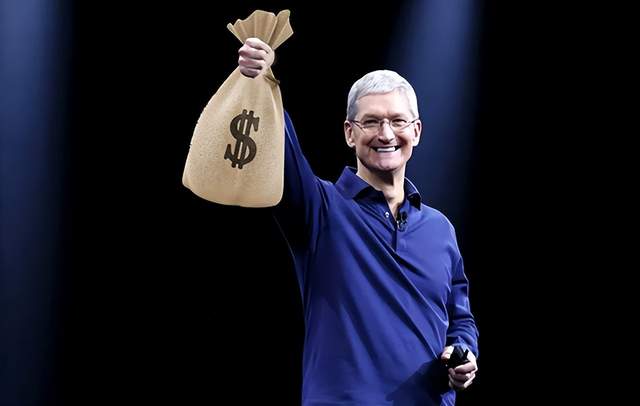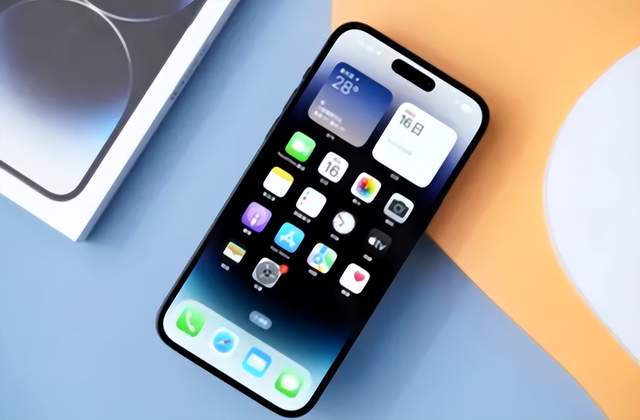Why did the iPhone price drop? Internet services contribute more profits, who's afraid of a price war!
![]() 08/08 2024
08/08 2024
![]() 558
558
Apple's second-quarter earnings report showed that the revenue generated by its services business reached a new high, accounting for nearly 30% of its total revenue, and its profit contribution was close to 50%. This indicates that Apple fans are more willing to spend money on services, and as long as Apple can successfully attract and retain users, it can generate continuous revenue and profits.

Apple's latest quarterly report shows that its services business accounts for 28% of its total revenue, with a continuing upward trend. This indicates that the services business, supported by Apple fans, is generating more revenue for Apple, which compensates for the loss caused by declining iPhone sales.
More importantly, the services business has a higher profit margin. Apple's hardware gross margin is 35.3%, while the services gross margin is 74%, more than double that of hardware. The earnings report also shows that although the services business accounts for less than 30% of Apple's total revenue, it contributes up to 50% of its profits, highlighting the profitability of the services business.
The high profitability of the services business is primarily attributed to revenue generated by the App Store. Compared to Android app markets, Apple not only charges users for downloading apps but also takes a 30% commission on in-app purchases. This allows Apple to generate significantly more revenue from its users compared to Android, a practice commonly referred to as the 'Apple tax'.
Faced with Apple's dominance, some powerful internet companies have attempted to resist but quickly capitulated. This is because iPhone users tend to be high-end customers who are more willing to spend on internet services. Under these circumstances, even the most formidable internet companies must compromise with Apple.

For Apple to maintain its strength, it is crucial to continuously attract and retain users, especially iPhone users. iPhone users are more inclined to spend on internet services compared to users of other Apple products such as Apple Watch and Mac, which explains why Apple has always placed significant importance on the iPhone. Additionally, the iPhone contributes nearly 50% of Apple's total revenue.
To ensure the stability of its services business, Apple needs to maintain stable hardware sales, particularly for its flagship product, the iPhone. Therefore, whenever iPhone sales decline, Apple promptly takes action, and price reductions have become a key strategy for boosting sales of recent iPhone generations.
Apple's price war has put significant pressure on domestic mobile phone manufacturers. With the iPhone 15 priced below 4,500 yuan, it has become increasingly difficult for domestic flagship phones to sell. The 618 shopping festival highlighted this trend, as even the latest Snapdragon 8 Gen 3 phones failed to make it into the top 10 best-selling list. Instead, older Snapdragon 8 Gen 2 phones priced lower dominated, while the iPhone 15 occupied the top three spots, indicating that consumers are willing to pay extra for the iPhone 15 when shopping for phones priced above 3,000 yuan.
The revenue and profits generated by the services business undoubtedly provide Apple with significant confidence. If the iPhone 15 fails to sell at 5,000 yuan, Apple will reduce the price further to 4,500 yuan. Price reductions are effective, and domestic consumers will buy as long as the price is right. More iPhone users mean more apps sold on the App Store and, consequently, more commission for Apple. This is the confidence behind Apple's continuous price reductions.

In the face of Apple's price war, domestic mobile phone manufacturers struggled during the 618 shopping festival. Their price reductions were minimal, especially for new flagship models. Instead, they relied on discounted older flagship phones priced at around 2,000 yuan to compete for customers. This suggests that they lack the courage to compete with Apple's price war using high-end phones and have resorted to selling as many phones as possible, even if it means lower sales volumes, as they cannot withstand Apple's aggressive pricing strategy.








